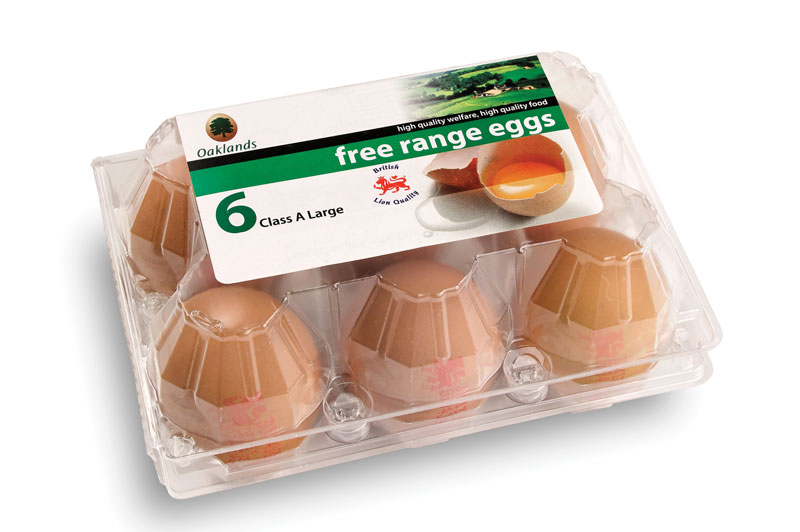
Oaklands Farms Eggs has reported an increase in both profits and turnover in its latest set of full year accounts.
Profits produced by the Shropshire-based egg company in the 12 months to the end of March 2013 were up by nearly 44 per cent. The pre-tax figure declared by the company in its annual accounts was £7.36 million - up by 43.9 per cent on the £5.1 million pre-tax profits achieved in the year to the end of March 2012. Turnover for 2013 was £63.2 million, which represented an increase of 31 per cent over sales during the previous 12 months. The figure for 2012 was £48.3 million.
In their directors' report, the Griffiths family who run Oaklands said that the business had performed well during the year, "with an increase in turnover translating into improved profitability.
The business continues to work to a defined strategy which takes into account the vagaries of market conditions ensuing from the introduction of the new legislation in 2012." The new legislation to which they referred was the European Union's ban on the use of conventional battery cages, which came into force in January 2012, although a number of EU states failed to meet the deadline.
The United Kingdom egg industry undertook a huge investment to switch from conventional cages to the new enriched colony cages. The investment is thought to have been as much as £400 million to comply with the new rules, and Oaklands Farm Eggs is believed to be the leading producer of colony cage eggs in the country. However, after shortages of eggs across Europe immediately following the introduction of the ban the cage egg market is now in oversupply. British Egg Industry Council (BEIC) chairman Andrew Joret has expressed fears that the current oversupply could be structural.
In its annual report, Oaklands Farm Eggs points to the emergence of some difficulties in the egg market. "Market conditions post year end have been turbulent," said the directors in their report. "The growth of small businesses specialising in free range has created a surplus at a time when demand is falling, resulting in significant downward price and margin pressure."
However, they said, "Notwithstanding market conditions, through the development of our own rearing capacity, colony production enhancement and related arable activities we are well placed and continue to enhance our ability to determine our progress."
The directors said, "The company's day-to-day activities expose it to a variety of financial risks that include credit risk and liquidity risk. The company operates with a strong balance sheet with sufficient cash reserves and financing facilities, which help mitigate the risks over the short to medium term. In January 2012 the company amalgamated its outstanding loans and fixed the rates of interest through interest rate swaps attached to the loan." A multi-million-pound finance deal was signed with HSBC Commercial Bank in order, it was said at the time, to fund further expansion.
A statement issued by HSBC in 2012 said that the agreement involved moving all of Oaklands' facilities to HSBC Commercial Bank. It said it provided the company with up to £28 million in a combination of term debt, asset finance and working capital.
HSBC said the deal would lead to the bank supporting Oaklands’ investment programme to increase production capacity and upgrade facilities to further improve the welfare of its hens. Oaklands said it intended to continue investing in new facilities to meet what it described as "unprecedented" demand for eggs since the introduction of the European Union ban on conventional cages.
The statement described Oaklands as the United Kingdom’s leading colony egg producer. The company handled some 500 million fresh, free range and organic eggs a year for retail, wholesale and food service customers, including Iceland, Aldi, Farm Foods, Bookers, Whitbread, Costco, Blakemore, Dairy Crest, Compass and 3663, which was supplying the eggs for the 2012 Olympics, it said. The statement said the new investment would give the company the capacity to process nearly one billion eggs a year through the development of new barns and packing stations.
Oaklands developed its own enriched cage system with Italian manufacturer Techno, which, it said, provided higher welfare standards than those demanded by the European Union. The system houses birds in 80-bird sections. Its development was completed in 2009 and in that year it won for the company the health and welfare award in the Pig & Poultry Marketing Awards. Oaklands says that the system has since been installed by a number of other egg producers around the world.
In its latest annual report, the company pointed to continuing investment in the development of the enriched cage systems. It said it had re-equipped the Harper Adams University poultry farm to put it at the "forefront of development of the new colony systems of production."
Despite the company's warning of difficulties in the egg market, the directors said in their report that the nature of their business helped to offset market volatility to an extent. "Our multiple sites of operation reduce our risks of perils. Volatile commodity prices of proteins and energy still mean production costs exposed to global influences," they said. "The company's farming operations continue with wheat production buffering it from the price volatility of the global commodities market."
But they said that the egg sector had been "under pressure in recent times as the continued recession, and demand being exceeded by production, means that customers are moving from premium to value or basic ranges." The ongoing volatility off the egg market was creating downward pressure on prices and margins, they said.
